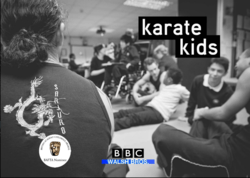My Life: Karate Kids
My Life: Karate Kids is a British documentary for the BBC [1] by John Walsh of Walsh Bros Ltd. and was narrated by Doctor Who actor David Tennant.[2] The film follows the friendship of two disabled children as they embark on learning Sanjuro Martial Arts and changing their lives forever. Karate Kids is a unique glimpse into a world that is ignored by mainstream society and misunderstood by many. This film challenges the perceptions around childhood disability.[3][4]
| My Life: Karate Kids | |
|---|---|
 Television poster | |
| Directed by | John Walsh |
| Narrated by | David Tennant |
| Country of origin | United Kingdom |
| Original language(s) | English |
| Production | |
| Executive producer(s) | Roger James |
| Producer(s) | John Walsh |
| Running time | 30 min. |
| Production company(s) | Walsh Bros Ltd. |
| Distributor | BBC |
| Release | |
| Original release | March 13, 2010 |
Sanjuro Martial Arts has its roots in traditional martial arts and a contemporary approach to teaching practical techniques that fit around the student’s abilities.[5] Developed by Glenn Delikan, Sanjuro strives to make martial arts available to all ages and abilities, offering a glimpse of physical independence to kids who are otherwise totally reliant on carers. By charting the progress of the children over several months, Karate Kids reveals the friendship, bullying, confidence and self-worth of children in a north London school.
Buoyed by physical breakthroughs kick-started in Sanjuro class, one character in the series, Tim Choi, benefits even more than most. Tim has never been able to move or communicate unaided, and relies on mum and best friend Francis to communicate his thoughts to the outside world. Karate Kids follows him through a very busy few months. Tim receives a national award from disability charity Cerebra, then runs for Class President, and then has his life transformed as laser technology offers him a voice of his own and some glimmer of independence.
Adult mainstream class members featured in the footage for the documentary include actor Alexander Dreymon[6]
Reception
The My Life series of film was created by the BBC as a direct result of the success of Sofa Surfers made by John Walsh in 2009.[7][8] The BBC regarded it as an attempt to make serious films for young people.[9] The Radio Times said "There’s plenty of inspiration to be gleaned".[10] The Tipperary Star called the film "a unique glimpse into a world that is ignored by mainstream society and misunderstood by many".[11]
Awards
The film was nominated for a BAFTA award in the Children's Factual category.[12][13][14]
External links
- Walsh Bros Ltd. official site
- My Life: Karate Kids on IMDb
References
- "My Life". RadioTimes.
- "My Life: Karate Kids". David Tennant News.
- http://www.bbc.co.uk/programmes/b00rl860/credits
- http://www.tvguide.co.uk/titlesearch.asp?title=My+Life%3A+Karate+Kids+()
- http://www.sanjuromartialarts.com
- walshbros (2010-03-23), Karate Kids - Narrated by David Tennant, retrieved 2017-04-27
- http://tbivision.com/2009/07/06/cbbc-launches-factual-strand-just-william-remake/
- "CBBC unveils new programme line-up". licensing.biz.
- http://xblock.site50.net/blogs/tv/2010/03/serious-documentary-for-children-on-cbbc.shtml
- http://www.radiotimes.com/episode/dwyn/my-life--series-4---1-my-life-the-big-climb
- http://www.tipperarystar.ie/news/local-news/thurles-director-spearheads-bbc-documentary-1-2275894%5B%5D
- http://awards.bafta.org/award/2010/childrens/factual
- "My Life". RadioTimes.
- http://lfs.org.uk/content/john-walsh-nominated-bafta-childrens-award-documentary-my-life-karate-kids